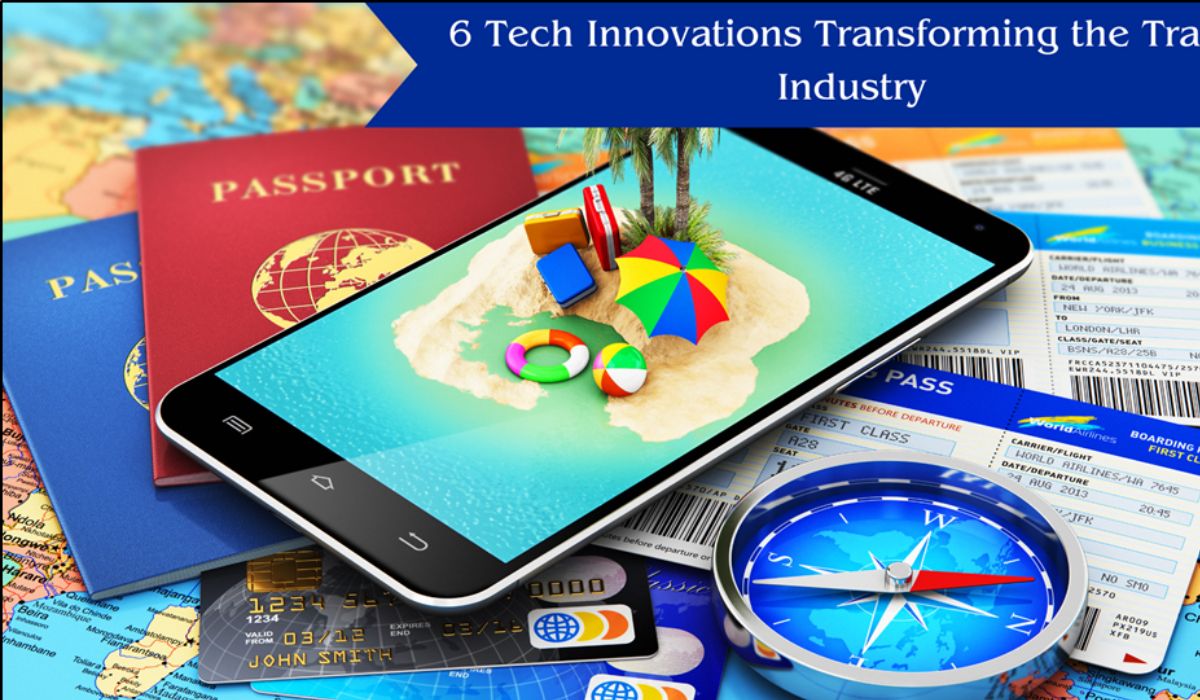TRAVEL & TOURS
6 Tech Innovations Transforming the Travel Industry

Traveling has always been about exploration and discovery, the tech revolution adds new dimensions to our adventures.
Imagine booking your summer holiday with just a few taps on your screen, receiving personalized offers that seem to have been designed expressly for you, and even checking out your destination without leaving your couch.
From smart devices that bestow easy travel to intelligent tools that make the travel experience more interactive, technology influences our tours around the world. Fasten your seatbelt as we explore six amazing tech innovations that are not only changing the world of tourism, but making your trips that much more pleasurable, time-saving, and memorable.
Want to know how technology will make traveling a more thrilling experience? Let’s get going!
What Is the Role of Technology in Transforming the Tourism Industry?
Technology is one of those huge factors transforming the tourism industry into an easy, personalized, and more enjoyable experience.
Technology can help enable these traveling individuals to quickly book their flights or hotels, receive recommendations based on their interests, or even virtually explore destinations they might travel to.
Intelligently designed tools, such as AI chatbots that handle bookings 24/7 and IoT devices in hotels that personalize experiences, are revolutionizing travel. Virtual reality offers a glimpse into journeys, while blockchain ensures secure transactions.
Another technological innovation is the eSIM technology that enhances seamless activation of local data plans, eliminating the need for physical SIM cards, and ensuring smooth connectivity for travelers. It is found that France ranks 6th in terms of people’s interest in using eSIMs.
Moreover, ESIM technology will make life even easier for travelers eliminating the need for physical SIMs, further enhancing their travel experience.
If you’re traveling to Paris, take advantage of eSIM France that allows for easy activation of local data plans, enhancing connectivity without the need for physical SIM cards.
Technological Developments in the Travel Industry
1. Advanced AI and Machine Learning Applications
AI and machine learning have started to make travel personalized and operations seamless. Shortly, AI algorithms will analyze huge data on users, including past behaviors and preferences, to include in giving highly relevant travel suggestions, almost magical.
This would drive up personalization, boosting bookings and increasing revenues manifold for travel companies. Artificial Intelligence-powered chatbots and virtual assistants also revolutionize customer service efficiently, handling a large share of routine inquiries.
They reduce frustration with long wait times and thus customer service costs. Moreover, predictive analytics are usually referred to as a crystal ball for the travel industry because, through machine learning, one can forecast travel trends and consumer behavior very accurately. This helps airlines and hotels identify key strategies to optimize for yielding increased revenue.
2. Blockchain Technology for Secure Transactions
Blockchain lets the travel marketplace introduce levels of security and transparency in transactions unimaginable, hence solving some very old problems of trust and fraud issues.
Smart contracts on the blockchain are changing bookings as they make sure both parties adhere to pre-agreed terms without intermediaries, hence drastically reducing fraud cases and making it a lot easier.
Decentralized traveling platforms cut out the middleman for travelers, affording them more control and potentially lower costs by reducing commission fees than one might find on a traditional platform. These decentralized applications bring more transparency and trust to the industry.
Finally, in a world where data breaches are more normal, blockchain provides a very real solution in security that reduces the possibility of personal data breaches and attracts more consumers willing to pay more for a service that will protect their data privacy.
3. Internet of Things (IoT) for Enhanced Travel Experiences
From intelligent transportation systems to intelligent hotel rooms, IoT is making travel interconnected.
IoT accommodations transform into high-tech havens where everything in the guest’s stay is personalized and controlled by the click of a button, greatly enhancing guest satisfaction and operational efficiencies through automated check-ins and smart room controls.
In transportation, IoT is enhancing connectivity throughout the journey-from airport travel to rental cars by reducing flight delays and cancellations, while improving passenger satisfaction with real-time tracking and communication.
Wearable technologies are also key enablers for travelers, featuring contactless payment, luggage tracking, and health monitoring, among other features that add to safer and more convenient travels.
4. Augmented Reality (AR) and Virtual Reality (VR) Enhancements
In 2024, the AR and VR industry is expected to bring in $40.4 billion in revenue. AR and VR are changing the way people fundamentally interact with travel, collapsing the inhibitions between physical and digital experiences into immersive previews that enhance exploration.
Virtual Reality changes the way people explore and choose destinations through a “try-before-you-buy” experience of places like never before, and this goes a long way in improving booking-to-visitation conversion rates and increasing spending on travel experiences.
By making the smartphone into an almost infinitely useful travel tool, augmented reality is showing us realities about the real world that was always there but could not be seen before, thereby enabling increased traveler satisfaction and spending.
More importantly, AR and VR have transformed travel marketing into an interactive and exciting time with content that lures caravans of prospective travelers—and, at many times, a price premium billed to travel packages using these breakthrough technologies.
5. Autonomous Vehicles and Drones in Travel
Self-driving cars and drones will revolutionize transportation and service delivery for the travel industry.
An autonomous car will make road travel safer by reducing traffic crashes and, in general, land journeys more efficient and accessible, perhaps affordable in innovative ways, making ride-sharing economies possible.
Meanwhile, drones bring into the picture very new exciting possibilities: aerial tours to make unique travel experiences and delivery services for amenities and items forgotten, while keeping hotel guests satisfied due to swift service.
With continued enhancements in these technologies, careful attention by the industry also has to be given to sometimes complex regulatory landscapes, to ensure safety and compliance. It addresses public concerns relating to the reliability and safety of autonomous vehicles and drones.
6. Integration of Big Data for Optimized Travel Solutions
Big Data is causing a revolution in the travel industry by making it more definitive in decision-making and delivering personalized services.
For instance, with the help of dynamic pricing and demand management, travel providers can regulate ticket prices and automobile rentals based on real-time demand changes. This will increase revenue and improve the occupancy rates of hotels.
Big data helps tourism companies make their campaigns more targeted, respecting precise audience segments and hence increasing their conversion rates while decreasing their acquisition costs.
Secondly, it boosts operational efficiency through streamlining processes and optimizes resource allocation, such as fuel cost reductions in airlines and improving customer satisfaction scores in hotels by efficiently managing the staff.
Frequently Asked Questions(FAQs)
- Does eSIM drain the battery?
No, ESIM technology does not drain the batteries more than what a physical SIM card would do. It works just the same and shouldn’t be hitting the battery life at all.
- What do you mean by travel technology?
Travel technology is the application of digital tools and innovations aimed at enhancing or smoothing out the travel experience. These include everything from booking systems and mobile applications to AI, IoT, and VR advancements that go into making traveling easier, more efficient, and more enjoyable. - How are AR and VR technologies impacting the travel booking process?
By enabling consumers to visually visit places and access interactive information, AR and VR technologies enhance travel booking by increasing confidence and decision-making.
Ready to Take a Tour With These Innovations?
The travel industry is about to enter a technological renaissance. From AI-powered personalization to blockchain-secured transactions, from IoT-connected experiences to immersive AR/VR previews, and autonomous transportation to data-driven optimizations, the aforementioned six innovations are not only improving travel but also rewriting its core again.
Looking ahead, it will indeed be those players in the travel industry that can successfully integrate such technologies into seamless, personal, and memorable travel experiences. Our journey of travel tech innovation is nowhere near being done, it’s only just getting underway.
TRAVEL & TOURS
Exploring Örviri: Meaning, Origin, and Cultural Significance

Introduction to Örviri
Welcome to the fascinating world of Örviri! This term may not be widely recognized, but it carries profound meaning and rich cultural significance. As we delve into its origins, you’ll uncover layers of history, tradition, and modern interpretations that shape how we view this intriguing concept today. From ancient practices to contemporary adaptations, Örviri is a tapestry woven with stories waiting to be explored. Join us on this journey as we unpack what makes Örviri so special and why it deserves a place in our hearts and minds.
Origin and Meaning of Örviri
The term “Örviri” has deep roots in various cultures, often tied to a rich tapestry of folklore and tradition. Its origin can be traced back to ancient languages, where it encompassed themes of connection and community.
At its core, Örviri signifies more than just a word; it embodies the spirit of unity among people. This concept resonates through storytelling and ritual practices that have been passed down generations.
In many regions, Örviri is associated with natural elements like water or earth, symbolizing life’s cyclical nature. The link between humanity and the environment is paramount here.
Understanding this meaning helps shed light on how communities view relationships with one another as well as their surroundings. It offers insight into cultural identities that remain vibrant today.
The Cultural Significance of Örviri
Örviri holds a special place in the hearts of those who practice it. This ancient tradition is not just a ritual; it’s a living expression of identity and community.
In many cultures, Örviri symbolizes resilience and continuity. It connects generations, allowing elders to pass down wisdom through stories and practices. As participants engage in Örviri, they reaffirm their bonds with ancestors and the land.
It also serves as a means for cultural exchange. Festivals celebrating Örviri attract diverse audiences, fostering understanding among different communities.
Artistic expressions often emerge from these gatherings—music, dance, and crafts that reflect the spirit of Örviri enrich local culture while encouraging innovation.
Through its vibrant presence in society today, Örviri stands as both an anchor to history and a pathway for future growth within cultural landscapes worldwide.
Traditional Uses and Practices Associated with Örviri
Örviri has deep roots in traditional practices across various cultures. It often serves as a symbol of community and unity, linking generations together through shared rituals.
In many regions, Örviri is used during seasonal festivals. These gatherings celebrate harvests or significant life events like births and weddings. Participants often wear traditional attire adorned with motifs that represent the essence of Örviri.
Craftsmanship also plays a vital role in its traditional use. Artisans create intricate items inspired by Örviri, reflecting cultural narratives passed down through time.
Healing practices sometimes incorporate Örviri elements too. Herbal remedies and spiritual guidance are intertwined, showcasing its holistic significance in daily life.
Storytelling remains another essential aspect tied to Örviri’s legacy. Elders share tales that encompass moral lessons and cultural wisdom, ensuring the spirit of Örviri continues to thrive within communities young and old alike.
Modern Interpretations and Adaptations of Örviri
Modern interpretations of örviri have evolved significantly, merging tradition with contemporary creativity. Artists today draw inspiration from its rich symbolism, infusing it into various forms like fashion and digital art. This blend captures the essence of örviri’s while appealing to younger audiences.
Social media plays a crucial role in this transformation. Platforms showcase reinterpretations that highlight the deeper meanings behind örviri’s, sparking discussions among enthusiasts and newcomers alike.
In wellness practices, some incorporate örviri’s motifs into meditation spaces or yoga sessions. These adaptations emphasize mindfulness and connection to heritage.
Moreover, festivals celebrating cultural diversity often feature örviri’s as part of their programming. Such events encourage collaboration between traditional artists and modern creators, fostering unity through shared experiences.
By intertwining past and present elements, these interpretations keep the spirit of örviri’s alive while inviting new generations to engage with its legacy.
Controversies Surrounding Örviri
The concept of örviri’s has not been without its share of controversies. Some traditionalists argue that modern interpretations dilute the essence and authenticity of this cultural practice. They believe that commercialization undermines its true significance.
Critics also point to misrepresentation in popular media, which often sensationalizes örviri’s for entertainment value. Such portrayals can lead to misunderstandings and perpetuate stereotypes, straying far from the original meaning.
Moreover, debates arise around ownership and appropriation. Who gets to define what örviri’s means today? Voices from indigenous communities stress the importance of respecting their narratives while navigating these discussions.
As society evolves, so do perceptions surrounding örviri’s. This ongoing dialogue reflects broader issues about culture’s place in a globalized world, making it an essential topic worth exploring further.
Preserving and Honoring the Legacy of Örviri
Preserving the legacy of Örviri’s is essential for maintaining cultural identity. Communities often engage in storytelling, passing down traditions from one generation to the next. These tales keep the spirit of Örviri’s alive and foster a sense of belonging.
Local festivals celebrate its significance through music, dance, and art. Participants dress in traditional attire that reflects their heritage. This vibrant expression connects people to their roots and showcases the beauty of Örviri’s.
Workshops and educational programs play a crucial role as well. They teach younger generations about historical practices associated with Örviri’s. By learning these customs, youth gain respect for their ancestry.
Social media platforms also contribute significantly to this preservation effort. Online communities share insights, photographs, and experiences related to Örviri’s, creating a global dialogue around its importance while engaging those who might be far removed from it culturally or geographically.
Conclusion
Örviri represents a rich tapestry of cultural heritage and traditions. Its meaning and origin are deeply rooted in the history of its people, carrying stories that resonate through generations. The cultural significance of Örviri’s extends beyond mere symbolism; it serves as a bridge connecting past practices with contemporary interpretations.
Traditional uses highlight the ways Örviri has been woven into daily life, showcasing rituals, festivals, and crafts that celebrate this unique concept. As society evolves, modern adaptations reflect a dynamic understanding of Örviri while honoring its origins.
Yet, discussions around Örviri can sometimes spark controversy. Different perspectives on its interpretation raise questions about authenticity versus innovation. Engaging with these dialogues is crucial for preserving what makes Örviri significant.
Efforts to honor and maintain the legacy of such an important aspect underscore our collective responsibility to respect tradition while embracing change. The journey of exploring Örviri continues—an evolving narrative filled with richness waiting to be discovered further.
ALSO READ: Discovering the Rich History and Cultural Significance of Cevıırı
FAQs
What is “Örviri”?
Örviri is a culturally rich term rooted in ancient traditions, often symbolizing unity, community, and the connection between people and nature. It represents both a concept and a practice that ties generations together through rituals, storytelling, and shared heritage.
Where did the concept of Örviri’s originate?
The origins of Örviri’s trace back to ancient languages and folklore, where it emerged as a symbol of human interconnectedness and respect for natural elements like earth and water.
How is Örviri’s practiced in modern times?
Today, Örviri’s is expressed through art, fashion, social media, and mindfulness practices. Festivals and workshops also celebrate its themes, blending tradition with creative innovation.
Why is Örviri’s culturally significant?
Örviri’s holds cultural importance as it embodies resilience, ancestral wisdom, and communal identity. It serves as a living tradition that connects the past with the present across generations.
Are there controversies related to Örviri?
Yes, some debates focus on the commercialization and reinterpretation of Örviri. Concerns include cultural appropriation and misrepresentation in media, which some believe dilute its original meaning.
TRAVEL & TOURS
Where to travel for birthday: US & Mexico trips you’ll actually remember

Picture blowing out candles somewhere new instead of at the same restaurant as last year. Figuring out where to travel for your birthday can turn your next age into a full-on experience – maybe chasing street food and museums, maybe just claiming a pool lounger with a cold drink and zero emails.
If you live in the U.S., you’re spoiled for birthday trip options close to home and just across the border. Below are easy ideas in American cities and Mexican hotspots that balance fun, food, and a realistic budget, so you can celebrate big without turning planning into a second job.
US city breaks that feel like a birthday upgrade
Sometimes the best gift is a boarding pass with your name on it. A quick birthday flight out of your home airport opens the door to long-weekend celebrations in spots like Austin, Miami, or Chicago, where you can cap off the day with live music, rooftop drinks, or a late-night slice that tastes extra good after the candles.
When you’re choosing places to travel for your birthday inside the U.S., think about your birthday personality. Las Vegas and New Orleans are perfect if your ideal night involves DJ sets, shows, and friends in one place, while Nashville, San Diego, and Denver lean more toward craft beer, good food, and easy access to the outdoors.
For a smoother trip, check what’s happening in town before you book. A big sports event or festival can spike hotel prices but also give you extra things to do. Shoulder seasons — spring and fall for most U.S. cities — usually bring milder weather, smaller crowds, and nicer rates for central hotels.
Beach and culture escapes in Mexico
Cancun and Riviera Maya for easy resort living
Cancun and the Riviera Maya stay high on the list of birthday destinations for a reason: they’re simple to reach from many U.S. cities, offer everything from budget hotels and boutique stays to all-inclusive resorts, and put you close to Caribbean-style beaches, cenotes, and Mayan ruins.
Some ways to shape a birthday weekend here:
- Morning: snorkel or take a catamaran to Isla Mujeres or Cozumel
- Afternoon: nap by the pool or book a spa treatment
- Evening: dinner on the beach, followed by bars or a low-key show in the hotel zone.
Puerto Vallarta and Mexico City for food and local color
On the Pacific coast, Puerto Vallarta mixes cobblestone streets and ocean views with plenty of nightlife, plus whale‑watching in season. If you’re more into museums than margaritas, Mexico City delivers world‑class art, leafy neighborhoods like Roma and Condesa, and some of the best tacos and tasting menus on the continent.
In Mexico, pick neighborhoods that make it easy to walk, take short rideshares, and get back to your hotel late at night without stress. Zona Hotelera in Cancun, the Romantic Zone in Puerto Vallarta, and central areas like Polanco or Roma Norte in Mexico City all give you restaurants, bars, and sightseeing within a short radius.
Match your trip style to your birthday mood
Before you start collecting birthday travel ideas, decide who’s actually coming along. A solo reset in Mexico City looks different from a couples’ spa weekend in Scottsdale or a loud group trip to Cabo. Knowing your crowd helps you choose the right mix of late nights, downtime, and activities everyone will actually enjoy.
Time and budget matter just as much as location. If you only have three days, aim for nonstop flights and minimal airport transfers so you’re not spending half your celebration in transit. With a full week, you can split your stay — two nights in a U.S. city for concerts and bars, then a few days on a Mexican beach to recover.
For a birthday that feels personal, build in at least one “headline” moment: a mezcal tasting with friends, a hot‑air balloon over Teotihuacán, a sunset sail, or tickets to a show you’ve wanted to see for years. Then leave pockets of unplanned time for naps, pool chats, and spontaneous detours that usually become the funniest stories.
Give yourself a birthday you’ll talk about next year
At the end of the day, the best birthday trip isn’t about checking off every sight; it’s about who you’re with and how you feel when the cake shows up. A weekend in New York, a taco crawl in Mexico City, or a few lazy days by the pool can all mark a new age in a way that actually feels like you.
When you start mapping out where to travel for birthday, use these U.S. and Mexico ideas as a starting point, then tweak the details so they match your budget, your energy level, and the people you want beside you as you blow out the candles.
TRAVEL & TOURS
Exploring the Beauty of myfavouriteplaces.org:// blog

In the vast landscape of the internet, myfavouriteplaces.org:// blog stands out as a beacon for travel enthusiasts. This platform is not just a website; it’s a gateway to a world of hidden gems, personalized recommendations, and community-driven exploration.
Unveiling Hidden Gems
The charm of myfavouriteplaces.org:// blog lies in its ability to unearth hidden gems. While popular destinations often take the spotlight, this platform encourages users to venture beyond the ordinary. From secluded beaches to quaint villages, myfavouriteplaces.org is a treasure trove of unique locations waiting to be discovered.
Navigating the User-Friendly Interface
One of the standout features of myfavouriteplaces.org:// blog is its user-friendly interface. Whether you’re a seasoned traveler or a novice explorer, the website’s intuitive design makes navigation a breeze. The layout is thoughtfully crafted to provide a seamless experience, ensuring that users can focus on the joy of exploration.
Personalized Recommendations
What sets myfavouriteplaces.org:// blog apart is its commitment to personalized recommendations. The platform employs sophisticated algorithms to understand user preferences and tailor suggestions accordingly. Imagine receiving travel recommendations curated just for you, based on your interests and past experiences.
ALSO READ: EXPLORING THE RICH HISTORY AND CULTURAL SIGNIFICANCE OF BUŠÍ
Community Engagement
Beyond the algorithmic magic, myfavouriteplaces.org thrives on community engagement. Users actively contribute by sharing their travel stories, photos, and tips. The sense of community adds a personal touch, making the platform more than just a travel guide – it becomes a shared journey of discovery.
Travel Stories and Inspiration
The travel stories shared on myfavouriteplaces.org are more than just narratives; they are a source of inspiration. Users recount their adventures, from awe-inspiring landscapes to heartwarming encounters with locals. These stories serve as a catalyst for others, igniting the spark of wanderlust.
Exclusive Travel Tips
One of the perks of exploring myfavouriteplaces.org is gaining access to exclusive travel tips. From off-the-beaten-path attractions to budget-friendly hacks, the platform is a treasure trove of insider information. These tips add a layer of depth to your travel experience, ensuring that every journey is filled with memorable moments.
ALSO READ: CHISPANDO: EVERYTHING YOU NEED TO KNOW
Curating Your Favorites
The ability to curate personal lists of favorite places is a game-changer. Users can create and organize their travel bucket lists, making it easier to plan future adventures. It’s like having a virtual scrapbook of destinations waiting to be explored.
Integrating Social Media
Myfavouriteplaces.org understands the importance of sharing experiences. The platform seamlessly integrates with social media, allowing users to showcase their travels to a broader audience. The joy of exploration is multiplied when it can be shared with friends, family, and fellow travel enthusiasts.
Stay Updated with Latest Trends
In the fast-paced world of travel, staying updated with the latest trends is crucial. Myfavouriteplaces.org ensures that users are well-informed about emerging destinations, travel trends, and must-try experiences. It’s your go-to source for staying ahead in the ever-evolving world of travel.
Connecting with Like-Minded Travelers
Beyond the destinations, myfavouriteplaces.org fosters connections. The platform brings together like-minded travelers who share a passion for exploration. Whether you’re seeking travel companions, advice, or simply a community to belong to, myfavouriteplaces.org has you covered.
ALSO READ: Exploring Barcelia: A Unique And Vibrant Destination
Planning Your Next Adventure
As you explore the myriad features of myfavouriteplaces.org, don’t forget to use the platform for planning your next adventure. Incorporate the recommendations, tips, and curated lists into your travel plans, ensuring that each trip is tailored to your preferences.
Benefits of Membership
While myfavouriteplaces.org is accessible to all, there are added benefits to becoming a registered member. Unlock exclusive features, personalized insights, and priority access to new features. Being a part of the myfavouriteplaces.org community comes with its own set of perks.
Mobile Accessibility
In a world where mobility is key, myfavouriteplaces.org ensures that you can carry your favorite places with you wherever you go. The platform’s mobile accessibility means that you can explore, plan, and share your travels on the go, enhancing the spontaneity of your adventures.
Conclusion
In conclusion, myfavouriteplaces.org:// blog is more than just a blog – it’s a portal to a world of exploration. With its user-friendly interface, personalized recommendations, and vibrant community, the platform redefines the way we discover and share our favorite places. Embark on a journey with myfavouriteplaces.org and let the adventure begin.
ALSO READ: Exploring Örviri: Meaning, Origin, And Cultural Significance
FAQs
Is myfavouriteplaces.org free to use?
Yes, myfavouriteplaces.org is free for all users to explore and enjoy.
How can I share my travel stories on the platform?
You can share your travel stories by creating an account on myfavouriteplaces.org and contributing to the community.
Are the travel tips on myfavouriteplaces.org trustworthy?
Absolutely. The travel tips on the platform are user-generated and based on real experiences, providing valuable insights for fellow travelers.
Can I access myfavouriteplaces.org on my smartphone?
Yes, myfavouriteplaces.org is fully accessible on mobile devices, ensuring you can explore your favorite places on the go.
What benefits do registered members get on myfavouriteplaces.org?
Registered members enjoy exclusive features, personalized recommendations, and priority access to new platform updates.

 HOME IMPROVEMENT11 months ago
HOME IMPROVEMENT11 months agoThe Do’s and Don’ts of Renting Rubbish Bins for Your Next Renovation

 BUSINESS12 months ago
BUSINESS12 months agoExploring the Benefits of Commercial Printing

 BUSINESS12 months ago
BUSINESS12 months agoBrand Visibility with Imprint Now and Custom Poly Mailers

 HEALTH7 months ago
HEALTH7 months agoThe Surprising Benefits of Weight Loss Peptides You Need to Know

 HEALTH7 months ago
HEALTH7 months agoYour Guide to Shedding Pounds in the Digital Age

 TECHNOLOGY10 months ago
TECHNOLOGY10 months agoDizipal 608: The Tech Revolution Redefined

 HOME IMPROVEMENT7 months ago
HOME IMPROVEMENT7 months agoGet Your Grout to Gleam With These Easy-To-Follow Tips

 HEALTH11 months ago
HEALTH11 months agoHappy Hippo Kratom Reviews: Read Before You Buy!














